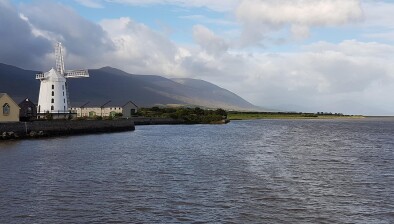Supreme Court: Decision to grant planning permission for Cork wind farm quashed
Planning permission for eleven wind turbines in Cork, granted by An Bord Pleanála, has been quashed in the Supreme Court.

About this case:
- Citation:[2019] IESC 90
- Judgment:
- Court:Supreme Court
- Judge:Mr Justice Donal O'Donnell
Emphasising the need for decision-making institutions to provide proper reasoning for decisions, Mr Justice Donal O’Donnell said that the Inspector who reported to the Board was wrong to exclude certain submissions from his consideration and that, by extension, the Board’s decision was flawed.
Background
Since 1992, Klaus Balz and Hanna Heubach (the appellants) have lived at Bear na Gaoithe, County Cork, where they have a gardening business.
Cleanrath Windfarms Limited sought permission to erect eleven turbines at Bear na Gaoithe – the nearest proposed turbine being 637 metres from the appellants’ house. This was initially granted by Cork County Council, but quashed in judicial review proceedings in the High Court.
Cork County Council subsequently granted permission for six turbines, which was appealed by Cleanrath. By a majority of 3:1, An Bord Pleanála granted permission for eleven turbines.
The Planning and Development Act 2000
In the High Court in 2018, Mr Justice Robert Houghton dismissed judicial review proceedings brought by the appellants and refused leave to appeal to the Court of Appeal.
The Supreme Court granted leave to appeal on the question of the application of Ministerial Guidelines issued under section 28 of the Planning and Development Act 2000 (as amended).
Section 28(1) states that the Minister “may, at any time, issue guidelines to planning authorities regarding any of their functions under this Act and planning authorities shall have regard to those guidelines in the performance of their functions”.
In contrast, section 29 of the Planning and Development Act 2000 states that “planning authorities shall comply with” Ministerial Policy Directives.
Mr Justice O’Donnell explained that the “clear distinction” was blurred because of an amendment to section 28 “which provided that where guidelines were issued on matters of policy, they also must be followed. However, it is accepted for present purposes that what were in issue here were guidelines under s. 28 simpliciter, and that the obligation on the respondent Board was merely to “have regard” to them”.
The Wind Energy Development Guidelines
Under section 28 of the Planning and Development Act 2000 (as amended), the Department of Environment, Community and Local Government may issue guidelines for planning authorities.
In 2006, the Wind Energy Development Guidelines were issued, dealing with issues related to wind power developments. Only one portion of the chapter on Environmental Implications, paragraph 5.6, sets out guidance on noise. Mr Justice O’Donnell said that at the heart of the present case was the observation in the guidelines that “[a]n appropriate balance must be achieved between power generation and noise impact”.
Mr Justice O’Donnell said it was accepted that the technical section of this aspect of the guidelines was drawn from a UK document entitled “The Assessment and Rating of Noise from Windfarms” issued by the Energy Technology Support Unit (ETSU) of the Department of Trade and Industry in 1996 (hereafter the 1996 ETSU document)
In the Supreme Court, the appellants submitted that the guidelines offered advice, and, even on their own terms, were not prescriptive, exclusive, or conclusive. The Board was required to have regard to the guidelines but was not obliged to follow or apply the guidelines in whole or in part in any individual case – and therefore had discretion in that regard. the appellants submitted that the Board was obliged to consider the scientific and technical information and material which bore on its decision – and in principle it was possible that an applicant could argue that the guidelines should not be applied “either because of material suggesting a general underlying deficiency in the guidelines, or by evidence of specific factors as to the guidelines in the context of the specific proposed development or the particular environment. It was submitted that the appellants had submitted material that was both general and specific in this sense”.
Finally, it was submitted that the Board’s “erroneous rejection of the scientific/expert materials and submissions thereon submitted by the appellants as irrelevant, and therefore not requiring consideration, amounted to a refusal to exercise in the discretion whether to follow the guidelines in whole or in part and in error treated the guidelines as prescriptive, conclusive, and exclusive”. Accordingly this amounted to a failure to perform a complete EIA.
The Board agreed that it must have regard to the guidelines; that it may depart from the guidelines; that it was obliged to carry out an EIA, and that it could not ignore submissions made to it that bear on matters within its jurisdiction. However, the Board stated that it did have regard to the guidelines, and after an EIA in which the appellants submissions were considered, it imposed a lower noise level than that recommended by guidelines (43 dB(A) rather than 45 dB(A)).
Material excluded from consideration
Mr Justice O’Donnell said that the “fundamental issue” was one of fact, “leading in turn to a relatively simple and familiar issue of public law”. Stating that there was nothing to be gained from recasting the case in terms of European law and the EIA Directive, Mr Justice O’Donnell said that the case “would succeed on the more basic ground, that the Inspector and Board had failed to have regard to a relevant consideration, in this case submissions made on behalf of the appellants”.
The Inspector’s Report, which was adopted by the Board, had deemed material submitted by the appellants to be irrelevant and excluded it from his consideration. By extension, this was excluded by the Board.
Mr Justice O’Donnell said that the Inspector’s approach was wrong in law, and therefore the Board’s decision was similarly flawed. Mr Justice O’Donnell said that it was “a basic element of any decision-making affecting the public that relevant submissions should be addressed, and an explanation given why they are not accepted, if indeed that is the case”.
Stating that this was “fundamental not just to the law, but also to the trust which members of the public are required to have in decision making institutions”, Mr Justice O’Donnell said it was necessary to quash An Bord Pleanála’s decision to grant permission in this case.








